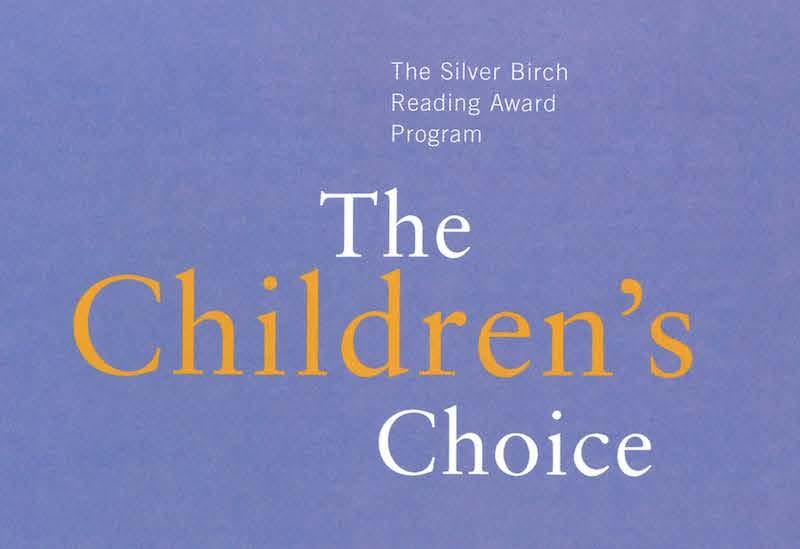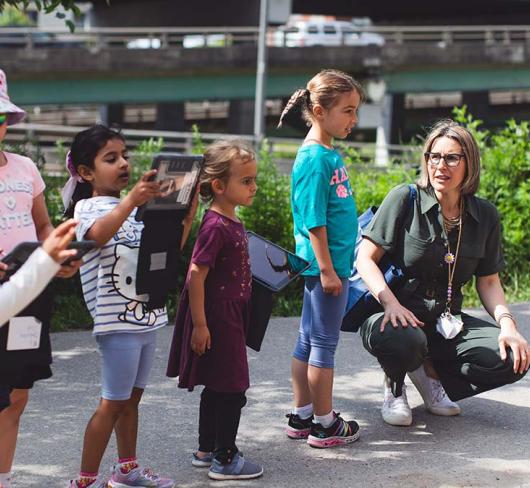
The Silver Birch Reading Award Program: The Children's Choice
As teacher-librarians, we collaborate with our classroom teachers to identify students who are reading at an independent level, and who could benefit from an enriched reading program. One such program is the Ontario Library Association’s Silver Birch Reading Award.
Created in 1992, the program brings an excellent selection of recent Canadian books, fiction and non-fiction, to our students’ attention. It rewards them for reading and makes them judges in a province-wide event as they vote for their favourite authors. The process includes voting lists, polling booths, a returning officer and scrutineers. Voting results are mailed from schools to Election Central in Toronto.
The Silver Birch program gives teachers and teacher-librarians a high-quality, inexpensive Canadian reading program that children love. It also encourages Canadian writing and Canadian authors and improves reading skills. Last spring, as a result of this initiative, over 70,000 Ontario students were reading recent Canadian fiction and non-fiction books in their school libraries, classrooms and public libraries.
Simply put, the Silver Birch Award Selection Committee nominates a list of recent Canadian children’s fiction and non-fiction books. Teacher-librarians purchase books from the list, which are available from the National Book Service. Students in grades 4, 5 and 6 read the books. To be eligible to vote for their favourite titles, the students must read at least five of the ten books listed in both categories. On a designated date in May, all qualified readers participate in a province-wide vote on who should win a Silver Birch Award.
After the program has been completed, the catalogued books are included in the school’s library collection. As a further help to teachers, the Silver Birch Awards package includes information on how the reading program can be used to meet the overall and specific expectations in each of the three grades through a variety of oral and written activities. In our schools, the teacherlibrarian runs the Silver Birch Award from March until June. A variety of activities are undertaken to support the program.
Although the Silver Birch Awards are normally presented in Toronto, the June 2000 event was held in London to tie in with the International Children’s Festival. This change of venue enabled students at Lord Elgin Public School to attend the ceremony. This exciting day allowed us to meet some of our wonderful Canadian authors.
Here's how we teach our Silver Birch program.
STAGE I - PREPARE FOR RESEARCH
Understanding the assignment: Participants must read five fiction and five non-fiction books from the given list in order to vote. Reading: Grades 4, 5 and 6 read a variety of fiction and non-fiction materials. Writing: Uses writing to reflect on thoughts, feelings and opinions.
STAGE ii - ACCESS RESOURCES
- Order program kit from the Ontario Library Association. Kit includes biography cards of authors, book reviews, E-mail addresses of authors, voting materials, information on author awards ceremony (June) including results/votes.
- Purchase 10 fiction and 10 non-fiction Canadian books from National Book Service. (Telephone 416-630-2950/1-800-387-3178)
STAGE ill - PROCESS INFORMATION
Students store the following information in a research folder:
- Birch Leaf Report - conference with teacher or teacher-librarian.
- My Reading Log - title, author, Dewey Decimal number, conference signature.
- Jot note page.
- Personal response to story; making personal connections. Suggested headings: What I liked about the book; What I felt about the main character; The novel was; I chose this word because; The author might change; New information I learned.
STAGE IV » TRANSFERRING LEARNING
- Complete a different activity for each Silver Birch book the student reads
(Activity page - in folder = Extending learning). - E-mail the authors = Computer connection.
- Invite a Silver Birch author to your school.
- Vote for your favourite authors - fiction and non-fiction = opportunity to learn first-hand about the democratic voting process.
- Record data on favourite Silver Birch authors.
- Show on the map of Canada the location of all the authors.
MORE IDEAS FROM THAMES VALLEY TEACHER-LIBRARIANS
- Rewrite the book as a play, short story, picture book, folk tale, soap opera, parody or screenplay.
- Write an introduction, epilogue, different ending or additional chapter.
- Put yourself in the place of the main character in the story. Write diary entries for five days when important events occurred.
- Create a list of 10 questions you would ask the author if you were to meet him or her today.
- Research information about the author.
- Make a timeline of the book’s events.
- Write a poem about a character.
- Write a biography of one of the characters.
- Create a new cover for your book.
- Choose a character from your book. Have your character write a short letter to the editor of the local paper.
- Choose five characters from your book. If you had to buy each one a gift, what would it be? Explain your choices.
- Write a book review for a newspaper or magazine.
- Become the author and tell why you wrote this book. Use examples from the book to support your argument.
- Use the author’s description to draw a particular character from your book. Include the character’s name and description, as well as the book title and author on your poster.
- Choose a character from your book. Have that character write a letter to “Ann Landers” seeking advice on a particular problem or sounding off on a story-specific gripe. Then write the reply to the character’s letter.
- Write a commercial for your book.
Get started on the Silver Birch Reading Program by ordering materials from the Ontario Library Association (OLA) at a cost of $20. Learn more by visiting www.accessola.org
The Ontario Library Association has a similar program, The Red Maple Reading Award, for grades 7, 8 and 9. For more information on this and other Ontario Library Association reading programs, contact Maria Ripley, Ontario Library Association, Suite 303, 100 Lombard Street, Toronto, ON M5C 1M3. (416) 363-3388. Fax: (416) 941-9581/ 1-800-387-1181. E-mail: info@accessola.com.
Jacqui Shields is a teacher-librarian at Lord Elgin Public School, London. Cathie Rose is a teacher-librarian at Wilfrid Jury Public School, London. Many thanks also to Marg Perez and Valerie Nielsen for activities developed under the More Ideas from Thames Valley Teacher-Librarians section.
Additional Resources
Koechlin, Carol and Sandi Zwaan. Information Power Pack: Junior Skillsbook for the Information Age. Markham, ON; Pembroke Publishers Ltd. 1997. IS B N : 1-55138-085-4. $12.95.
Koechlin, Carol and Sandi Zwaan. Information Power Pack: Intermediate Skillsbook for the Information Age. Markham, ON; Pembroke Publishers Ltd. 1998. ISBN: 1-55138-086-2. $12.95.
Koechlin, Carol and Sandi Zwaan. Teaching Tools for the Information Age. Markham, ON: Pembroke Publishers Ltd. 1997. ISBN: 1-55138-085-6. $14.95.
Information Studies K-12. Ontario School Library Association. Toronto. 1999. $10.00.
